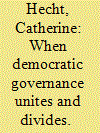|
|
|
Sort Order |
|
|
|
Items / Page
|
|
|
|
|
|
|
| Srl | Item |
| 1 |
ID:
148791


|
|
|
|
|
| Summary/Abstract |
How has the salience of democratic governance varied as an issue and as a basis of social status in the United Nations General Assembly (UNGA) over time? International Relations (IR) scholars typically assume a high salience of democratic governance in international society after the Cold War, yet evidence suggests important fluctuations and that these assumptions should be qualified. This article presents quantitative and qualitative results of a manually-coded content analysis of the UNGA General Debates between 1992 and 2014, with comparison to 1982, illustrating variation in the frequency and content of state representatives’ references to democracy and the use of democratic governance as a symbol of status. What factors influence the salience of a given dimension of social status in an international organisation? Explanations supplement IR approaches with insights from social psychology, including the relevance of high and low identifiers, accessibility, fit, current and anticipated group status, and regional status concerns. The article analyses trends in states’ support for principles underpinning international order, which have broader implications for literature on global governance and status in world politics as well as for international democracy support.
|
|
|
|
|
|
|
|
|
|
|
|
|
|
|
|
| 2 |
ID:
178177


|
|
|
|
|
| Summary/Abstract |
Scholars and practitioners are increasingly attentive to contestation against symbols and institutions underpinning international order(s). Yet International Relations scholarship can benefit from greater understanding of ways in which contestation interacts with salient dimensions of social status in specific international organizations (IOs). Drawing on evidence from the history of the Organization for Security and Co-operation in Europe (OSCE), with a focus on democratic governance and human rights, this article analyzes status-related contestation as a significant, yet under-examined type of contestation in multilateral diplomacy. Status-related contestation conveys dissatisfaction about symbols, institutions, and actors which reinforce socially significant divisions that place a state (or group of states) at a social disadvantage in a particular multilateral venue. International organizations provide unique social contexts which affect the content of contestation. Building on scholarship in social psychology, constructivism, and status hierarchies in world politics, the article analyzes the evolution of a dimension (or basis) of social status in the OSCE and illustrates that, beyond domestic and material interests, state representatives communicate social identity-related concerns through language, for example, that expresses discontent with dividing lines, unfairness, or (dis)respect, in attempting to minimize negative social identities in multilateral organizations.
|
|
|
|
|
|
|
|
|
|
|
|
|
|
|
|
|
|
|
|
|